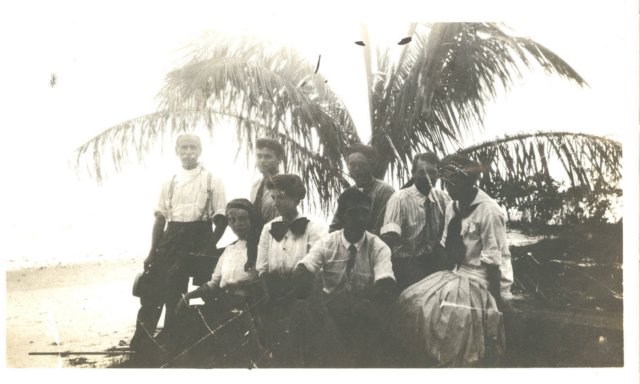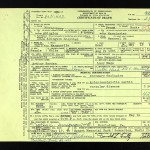Happy New Year!
We want to begin this new year by looking back… “Auld Lang Syne”, which is loosely translated as “old long since”, or “long long ago”. What that means in Koreshan history is that there is really no dividing line, as though it all ended with the death of Cyrus Teed. The Koreshans were real people and their lives did not end in December 1908. So here is a look at what happened to some of those people.
Marguerite Borden:
 In 2010 we received a link to the website of the Alpine Historical Society in Alpine California. One of their notable residents was Marguerite Borden Head, a former member of the Koreshan Unity who, by the early 1920’s, had become the librarian of the town of Alpine. Her son, Vic, writes of his mother, Marguerite, who wrote poetry under the pen name of Zuella Sterling.
In 2010 we received a link to the website of the Alpine Historical Society in Alpine California. One of their notable residents was Marguerite Borden Head, a former member of the Koreshan Unity who, by the early 1920’s, had become the librarian of the town of Alpine. Her son, Vic, writes of his mother, Marguerite, who wrote poetry under the pen name of Zuella Sterling.
Marguerite is known here as a member of the Koreshan Unity Orchestra, playing the piano. She was a part of that “second-generation” of Koreshans, along with the likes of the McCready sisters, Bertie and Ruth Boomer, Claude Rahn and Imogene and Laurie Bubbett.
Marguerite married Robert Head in 1910 and moved to New Hampshire, then to California (and the connection to Alpine), then back to New Hampshire. She apparently divorced in 1929 and in 1945 sold her home and moved back to Alpine where she was thought to have died, but her death certificate (right) says otherwise. She died in Montgomery County, Pennsylvania in 1954.With so many Koreshans, they seemed to disappear after the death of Cyrus Teed and the slow decline of the Unity. It is nice to see one who went on to a very successful life.
As mentioned, Marguerite is known for her poetry. A Google search for “Zuella Sterling” turns up a very interesting array of articles and music that Marguerite either wrote or contributed to.
Then there was Franklin Jacke…
Franklin Jacke was born on January 12, 1875 in Woodland Wisconsin. He had what could be termed a “tragic” life because of the fact that he suffered physically as a hunchback and eventually took his own life on March 31, 1936. According  to the late Evelyn Horne, “Franklin came to the Koreshan Unity at Estero in 1903 from Chicago. He was a strong believer of the Koreshan doctrine. Franklin was the manager and store keeper of the Koreshan Unity General Store, serving the people of Estero and surrounding communities. People came as far as Sarasota and Punta Gorda for the Koreshan home baked bread, fresh country eggs, and vegetables raised by the Koreshans.”
to the late Evelyn Horne, “Franklin came to the Koreshan Unity at Estero in 1903 from Chicago. He was a strong believer of the Koreshan doctrine. Franklin was the manager and store keeper of the Koreshan Unity General Store, serving the people of Estero and surrounding communities. People came as far as Sarasota and Punta Gorda for the Koreshan home baked bread, fresh country eggs, and vegetables raised by the Koreshans.”
At the time of his death, he was manager of the Koreshan Unity store. When he died, Claude Rahn wrote in the “Community Current Events” column of the “Flaming Sword”
The sudden and unexpected death of Brother Franklin F. Jacke which occurred on Tuesday, March 31st, cast a pall of sorrow over our community and among his many friends in the county. Failing eyesight which presaged the possibility of total blindness, and the mounting cares of the Unity store of which he had been the active manager for many years were doubtless the immediate factors responsible for his passing. Brother Franklin who was of a kindly and friendly disposition was born in Woodland, Wisconsin, sixty one years ago, and joined the Unity in 1903, at which time he came to Estero. Except for a short absence while employed in the activities of the Koreshan Unity Co-operative in Bristol, Tenn. he had been in continuous management of our local store, and had developed it into being one of the best arranged and stocked rural general stores in southwest Florida. He was buried in our local cemetery, and the management of the store was placed in the care of Mr. Marion F. Strickland who for some time had been managing our gasoline filling station, and who has had considerable experience in a similar business in this state.” — FLAMING SWORD–v.50, No.5, May 1936, p.13
Lyn Millner in her book The Allure of Immortality wrote about Franklin:
The followers’ faith in Koresh was still strong: “The Master, though unseen is surely sustaining his ‘little flock’ and bestowing his blessing,” a Koreshan wrote in the Flaming Sword in 1936 [See above] as the group prepared to celebrate Teed’s birthday. Even when the post office burned clown, incinerating Teed’s skull and several bones, their belief didn’t seem to waver.” But many of them suffered from physical and emotional pain. There’s a poignant example of this in Franklin Jacke, the hunchbacked keeper of the general store. He came to Estero with the big group in 1903 and took pride in his job keeping the store well stocked and arranged. When the new store opened in the mid-1920’s, he sent his mother a postcard photo of it, writing her that tourist and northerners often remarked that it was the best-kept store they had seen But over the years, ]acke’s eyesight failed, and the store faced financial trouble. By the 1930s, during the time Rahn wrote about, Jacke was in a deep depression. He struggled until he could do it no more. At age sixty one, he committited suicide.
“Dear Folks: I am about blind, cannot see to do my work today. With all the business cares which no one knows, I am unable to stand this I have gone to the river. Look for my hat on the point. I am so blind cannot see people in the store; just a dim outline.” A few Koreshan brothers waded into the river and found the body. The deputy who examined Jacke found deep scratches on his face. It appeared that either before or after jumping into the water, he had tried to claw out his own eyes. George Hunt found the hat and, nearby, ]acke’s coat, pocket watch, and handkerchief neatly folded on the bank.”
Read his obituary and view his gravesite information by going to the Find-A-Grave website.
Finally, whatever happened to some of the earliest members of the Unity, such as James Bubbett:
January 8th marks the 172nd anniversary of the birth of James H. Bubbett, one of the early Koreshan pioneers. Born in Washington County Pennsylvania in 1844, James eventually ended up in Quincy Illinois, and then Chicago, which is where it is believed that he took an interest in Cyrus Teed and Koreshanity. This “interest” included his wife, Evelyn (nee Trickett). They had married in Adams County Illinois on October 24, 1870. James apparently received an Army pension of six dollars per month according to records of the Adams County Genealogical Society. He was apparently wounded in the left arm, having served as a private in the Pennsylvania 155th, which fought at Antietem, among other battles, although it is unclear exactly when James served. After his death, Evelyn filed for a widow’s pension
believed that he took an interest in Cyrus Teed and Koreshanity. This “interest” included his wife, Evelyn (nee Trickett). They had married in Adams County Illinois on October 24, 1870. James apparently received an Army pension of six dollars per month according to records of the Adams County Genealogical Society. He was apparently wounded in the left arm, having served as a private in the Pennsylvania 155th, which fought at Antietem, among other battles, although it is unclear exactly when James served. After his death, Evelyn filed for a widow’s pension
According to Marie McCready, James directed the mechanical phases of the printing and publishing operations. At the departure of Annie Ordway in 1909, he became president of the K. U. until his death in 1924. He also played second violin in the Koreshan Orchestra. (no pun inteneded)
Along with his wife, Evelyn, James was one of the early followers of Teed. His three children, Imogene, who married Claude Rahn, (who has been mentioned many times in these posts). James and Evelyn also had two sons, LeRoy, who did not stay in Estero, but returned to Chicago, although he supposedly remained a Koreshan, and Laurence, known as “Laurie” who remained in Estero, eventually becoming K.U. President himself and becoming one of the few remaining Koreshans until his death in 1960.
You can read more of the Bubbett Geneaology on our website.
In the “what to read” department, we have, of course, noted the wonderfully complete book by Professor Lyn Millner, The Allure of Immortality.
If you are looking for more, there is another scholarly book which includes mention of the Koreshans. It is called Upstate Cauldron: Eccentric Spiritual Movements in Early New York State by Professor Joscelyn Godwin.
